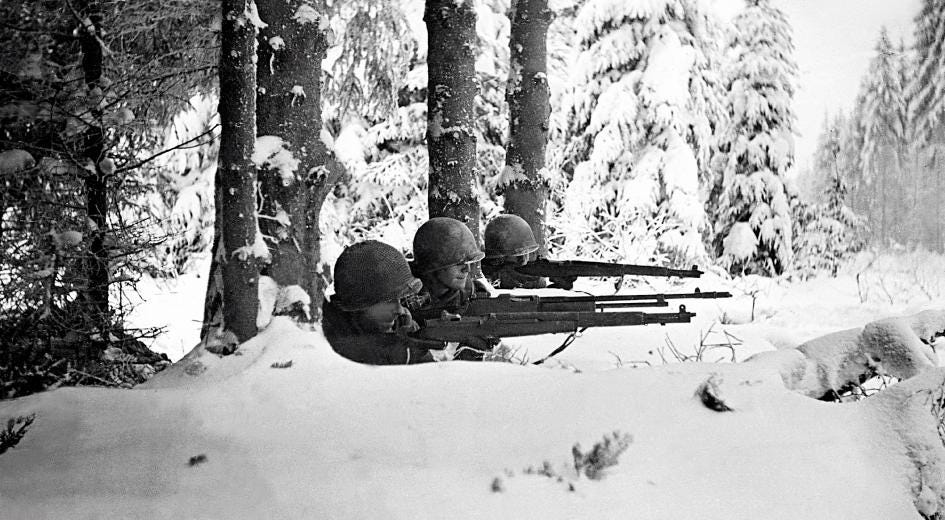Look beyond luck for your victories
The Battle of the Bulge and Hitler's delusions
It’s Veterans Day! So let’s do a short history lesson on one of the most consequential battles of World War II.
Following the Allied landings in France that June of 1944, Anglo-American forces were working their wear north and earth across France, toward Belgium and the western border of Germany. In the dense Ardennes forest region of Belgium, the Nazis made their last significant counter-offensive to stave off Allied advances into the German frontier.
This is known as the Battle of the Bulge. There’s an interesting lesson on life to be found in this story.
The Battle of the Bulge is largely considered to be the most grueling American fight of World War II in Europe. D-Day was a big deal but falls short of the intensity of this six-week struggle in the deadly cold of winter. You’ll hear the Battle of Bulge talked about like it was both massive and competitive. Sort of like it was the clash of the Titans or something. It really wasn’t though. Historians looking back on the nastiest clash of the war are in pretty uniform agreement it was actually a total wash for the Nazis, doomed to failure from day one.
Why? Because Hitler and the Germans went forward with the attack due to an advantage they’d gained from bad weather. Bad weather = Allied bomber planes stay grounded.
That is your plan? WEATHER?! Y’all, weather conditions can be a godsend in war and turn the tides of key battles. We know this. But if your strategy is based on a factor you don’t have any control over, well, good luck with that.
Initially, the bad weather ploy helped Germany. Running from December 16th, 1944 to January 25, 1945, the battle began with the Allies taken completely off guard and the Germans routing them effectively.
Maybe hubris opened the door to this initial setback. The Allies had just won a decisive victory in France, and they could see how the German lines were collapsing and falling back. They had taken France back from the Nazis with remarkable speed. So, they were not expecting something they should have expected when taking Europe back from a rabid dog like Hitler. That he might act irrationally and like a rabid dog.
Hitler was in the near peak of his drug-addled state in the war. Strung out on drugs adjacent to heroin and surrounded by sycophants unwilling to tell him “no” after some recent failed assassination attempts (such as the Stauffenberg plot portrayed by Tom Cruise in “Valkyrie”), Hitler was making all sorts of prophetic gestures about how the Reich would push the Allies back. So when a heavy fog and cloud-cover rolled into the Aredennes at the time Hitler wanted to try and retake the city of Bastogne, he thought it a sort of divine signal to go forward with the attack on the Allies.
The Nazis ripped through the Allied lines in the first week of the battle. Their primacy on the ground hinged on the element of surprise and the fact that the Allies could not get their planes off the ground to provide aerial bombardment. You’ll never guess what happened next.
On Christmas morning, the skies cleared up. In about three weeks this battle was over, and it was never even truly competitive once the luck factor vanished. The possibility of a German comeback was a mirage.
In that forest 1,000,000 Allied troops, including some 500,000 Americans, fought in the Battle of the Bulge, with roughly 19,000 soldiers killed, 47,500 wounded and 23,000-plus missing. About 100,000 Germans were killed or captured.
Make plans based on factors you can control and account for. Look for advantages you have that no one can take away from you. Don’t be surprised or stake your fortunes (or others’ lives) on things beyond your control.
This is the way. And thank you all our nations Veterans. We owe you more than we’ll ever know.
“Being unexpected adds to the weight of a disaster, and being a surprise has never failed to increase a person’s pain. For that reason, nothing should ever be unexpected by us. Our minds should be sent out in advance to all things and we shouldn’t just consider the normal course of things, but what could actually happen. For is there anything in life that Fortune won’t knock off its high horse if it pleases her?”
- Seneca, Moral Letters



